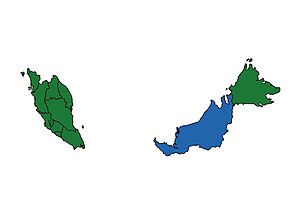Religion in Malaysia (2020)[1][2]

Dark green: Muslim majority > 50%
Light green: Muslim plurality < 50%
Blue: Christian majority > 50%
Islam is the state religion of Malaysia, as per Article 3 of the Constitution. Meanwhile, other religions can be practised by non-Malay citizens of the country.[4] In addition, per Article 160, one must be Muslim to be considered Malay.[5] As of the 2020 Population and Housing Census, 63.5 percent of the population practices Islam; 18.7 percent Buddhism; 9.1 percent Christianity; 6.1 percent Hinduism; and 2.7 percent other religion or gave no information. The remainder is accounted for by other faiths, including Animism, Folk religion, Sikhism, Baháʼí Faith and other belief systems.[6][7][8] The states of Sarawak and Penang and the federal territory of Kuala Lumpur have non-Muslim majorities.[3][9] Numbers of self-described atheists in Malaysia are few as renouncing Islam is prohibited for Muslims in Malaysia. As such, the actual number of atheists or converts in the country is hard to ascertain out of fear from being ostracised or prosecution.[10][11] The state has come under criticism from human rights organisations for the government's discrimination against atheists, with some cabinet members saying that "the freedom of religion is not the freedom from religion".[12][13]
Islam in Malaysia is represented by the Shafi'i version of Sunni theology and the practice of any other form of the religion (such as Shia Islam) is heavily restricted by the government.[14][15] The constitution guarantees freedom of religion while establishing Islam as the "religion of the Federation" to symbolise its importance to Malaysian society.[14][15] Malaysian Chinese practice various faiths: Mahayana Buddhism and Chinese traditional religions (including Taoism). Hinduism is practised by the majority of Malaysian Indians. Christianity has established itself in some communities, especially in East Malaysia.
Relations between Islam and the other religious groups in the country are generally quite tolerant, even though members of different religious groups do tend to have more homogeneous personal relations, particularly based on ethnicity and religion.[16] Eids, Wesak, Christmas, Lunar New Year, and Deepavali have been declared national holidays. Race, religion and politics are closely intertwined in Malaysia, and various groups have been set up to try to promote religious understanding among the different groups.
- ^ "Taburan Penduduk dan Ciri-ciri Asas Demografi" (PDF). Jabatan Perangkaan Malaysia. p. 82. Archived from the original (PDF) on 13 November 2013. Retrieved 25 March 2019.
- ^ "Key Findings of Population and Housing Census of Malaysia 2020" (pdf) (in Malay and English). Department of Statistics, Malaysia. ISBN 978-967-2000-85-3.
- ^ a b "Department of Statistics Malaysia Official Portal".
- ^ Constitution of Malaysia:Article 3-1
- ^ Constitution of Malaysia:Article 160-1
- ^ "Malaysia". United States Department of State. Retrieved 21 July 2023.
- ^ "Taburan Penduduk dan Ciri-ciri Asas Demografi" (PDF). Jabatan Perangkaan Malaysia. p. 82. Archived from the original (PDF) on 13 November 2013. Retrieved 25 March 2013.
- ^ "Population Distribution and Basic Demographic Characteristic Report 2010 (Updated: 05/08/2011)". Department of Statistics, Malaysia. Retrieved 11 March 2017.
- ^ "Malaysia Christians pray for peace, equality, freedom - UCA News".
- ^ Chen, Heather (2 April 2021). "Renouncing Islam in Malaysia Is Dangerous. We Spoke to Those Who Did It". Vice. Archived from the original on 2 April 2021. Retrieved 18 May 2023.
- ^ "2022 Report on International Religious Freedom: Malaysia". US Department of State.
- ^ "Putrajaya: Freedom of religion does not equal freedom from religion". 23 November 2017. Retrieved 10 March 2018.
- ^ Robert Evans (9 December 2013). "Atheists face death in 13 countries, global discrimination: study". Reuters.
- ^ a b Ambiga Sreenevasan (18 July 2007). "PRESS STATEMENT: Malaysia a secular State". The Malaysian Bar. Retrieved 11 March 2017.
- ^ a b Wu & Hickling, p. 35.
- ^ "Racism has poisoned Malaysian politics for far too long". The National. 26 November 2018. Retrieved 21 April 2019.